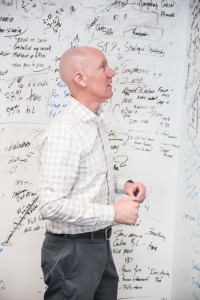Craig Manning studies chaotic lists and drawings that fill his office walls from floor to ceiling.

These walls represent the competitive advantage Manning gives BYU athletes through mental strength counseling, an advantage Manning once lacked.
As a teenager, Manning felt inadequate and without direction for the first time in his life after mentally breaking down during a pro tennis tour as a teenager. Manning decided to become a sports psychologist in part from the problems he faced as a 17-year-old on pro tour as an amateur tennis player.
“It was really good at first,” Manning said. “I did really well the first month. Then I started getting homesick and started to let the doubts creep in. I thought that practice makes perfect, so I tried to train harder but it was only getting worse. I kind of got on a bad spiral. I kept working hard, but for the first time ever in my life I felt like I was underachieving.”
It was then that Manning realized that centering his identity around tennis wouldn’t bring him the joy he sought and began searching for what would. That search eventually led him over 8,000 miles from his home to BYU.
Manning grew up in Canberra, Australia, in what he describes as a “good, tight family,” very involved in sports. He grew to love tennis and focused most of his attention on it.
He was selected for an Australian team to travel Europe on the pro tour as an amateur, and he left home within a month of graduating high school.
After six months on tour, Manning returned home to Australia where he struggled to enjoy tennis and find an identity outside of the sport. He tried working for his father’s accounting firm, but decided to go back to school.
Manning received a tennis scholarship offer from BYU, which he initially turned down to explore other options. But after looking at other offers, Manning says he “just felt good about BYU.” He accepted the offer with little understanding of what the school was about, having never even heard of the LDS Church before. Six months after arriving in Provo, Manning was baptized.
At BYU, Manning earned master’s degree in psychology studying the mindset athletes need to excel at their sport.

Manning took the women’s tennis head coach position while pursuing his Ph.D. in sport psychology at the University of Utah. By applying his research to coaching the Cougars, the team won four Mountain West Conference titles, earning Manning the conference Coach of the Year award three times and NCAA regional Coach of the Year award in 2005.
After 14 years of coaching, BYU’s director of athletics contacted Manning about working with all of the university’s sports programs as a mental strength coach.
Discus thrower Craig Merkley works with Manning to gain a competitive edge through efficient planning and goal setting. Merkley learned Manning’s system through one-on-one visits and a performance psychology class Manning teaches at BYU. Merkley feels Manning’s ability to connect with athletes is a large part of his success.
“He’s an easy person to get to know,” Merkley said. “He’s very easy to talk to, very approachable. So it makes it easy to trust him when you’re working with him.”
BYU standout and NFL prospect Bronson Kaufusi also worked with Manning regularly. Kaufusi says what impressed him most about Manning is the knowledge and experience between his education, playing career, coaching and continual research. Manning wrote a book called “The Fearless Mind” and has multiple scholarly articles published in journals. Kaufusi said that kind of experience is what helped him take his game to the next level.
“All elite players are big and strong. That’s normal,” Kaufusi said. “But it’s your mental game that sets you apart. So working with Craig gave me a new weapon to bring to battle on game day.”
After his initial successes at BYU, Manning built his list of clients, including Red Bull and U.S. Winter Olympic athletes. Manning has helped multiple athletes win world championships.
But these accomplishments aren’t what drive Manning.
“The most rewarding thing of all is when you get somebody that is struggling in life and you help them overcome something,” Manning said. “It just sets them free in life in general. That’s by far the most rewarding. More than winning championships and companies making money is when you help somebody else in their life.”
Manning receives occasional letters from people thanking him for making a difference in their life through his work. He keeps these letters to remind him of his situation as a 17-year-old searching for an identity in life. An identity he found through helping other people change theirs.
“Every once in a while I get a letter from someone who read my book or got on my website,” Manning said. “Someone I’ve never even met in person, and they’ll say, ‘Thank you so much, this changed my life.’ That means more to me than winning any championship.”




